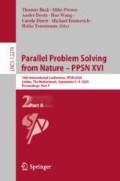Abstract
In recent years, there has been a growing interest in multiobjective evolutionary algorithms (MOEAs) with a selection mechanism different from Pareto dominance. This interest has been mainly motivated by the poor performance of Pareto-based selection mechanisms when dealing with problems having more than three objectives (the so-called many-objective optimization problems). Two viable alternatives for solving many-objective optimization problems are decomposition-based and indicator-based MOEAs. However, it is well-known that the performance of decomposition-based MOEAs (and also of indicator-based MOEAs designed around R2) heavily relies on the scalarizing function adopted. In this paper, we propose an approach for generating novel scalarizing functions using genetic programming. Using our proposed approach, we were able to generate two new scalarizing functions (called AGSF1 and AGSF2), which were validated using an indicator-based MOEA designed around R2 (MOMBI-II). This validation was conducted using a set of standard test problems and two performance indicators (hypervolume and s-energy). Our results indicate that AGSF1 has a similar performance to that obtained when using the well-known Achievement Scalarizing Function (ASF). However, AGSF2 provided a better performance than ASF in most of the test problems adopted. Nevertheless, our most remarkable finding is that genetic programming can indeed generate novel (and possible more competitive) scalarizing functions.
The first author acknowledges support from CONACyT and CINVESTAV-IPN to pursue graduate studies in Computer Science. The second author gratefully acknowledges support from CONACyT grant no. 2016-01-1920 (Investigación en Fronteras de la Ciencia 2016) and from a SEP-Cinvestav grant (application no. 4).
Access this chapter
Tax calculation will be finalised at checkout
Purchases are for personal use only
Notes
- 1.
Source code for ELGP is available at: https://github.com/lacava/ellen.
- 2.
The source code of MOMBI-II is available at:
https://www.cs.cinvestav.mx/~EVOCINV/software/MOMBI-II/MOMBI-II.html.
- 3.
The source code of our approach is available at:
http://www.computacion.cs.cinvestav.mx/~abernabe/scalarizing_functions.
References
Banzhaf, W., Francone, F.D., Keller, R.E., Nordin, P.: Genetic Programming: An Introduction on the Automatic Evolution of Computer Programs and Its Applications. Morgan Kaufmann Publishers, San Francisco (1998)
Brockhoff, D., Wagner, T., Trautmann, H.: On the properties of the \(R2\) indicator. In: 2012 Genetic and Evolutionary Computation Conference (GECCO2012), pp. 465–472. ACM Press (2012). ISBN: 978-1-4503-1177-9
Coello Coello, C.A.: A comprehensive survey of evolutionary-based multiobjective optimization techniques. Knowl. Inf. Syst. 1(3), 269–308 (1999)
Deb, K., Thiele, L., Laumanns, M., Zitzler, E.: Scalable test problems for evolutionary multiobjective optimization.In: Abraham, A., Jain, L., Goldberg, R. (eds.) Evolutionary Multiobjective Optimization. Theoretical Advances and Applications, pp. 105–145. Springer, USA (2005)
Hardin, D.P., Saff, E.B.: Minimal Riesz energy point configurations for rectifiable \(d\)-dimensional manifolds. Adv. Math. 193(1), 174–204 (2005)
Hernández Gómez, R.: Parallel Hyper-Heuristics for Multi-Objective Optimization. Ph.D. thesis, Department of Computer Science, CINVESTAV-IPN, Mexico City, México (2018)
Hernández Gómez, R., Coello Coello, C.A.: Improved metaheuristic based on the \(R2\) indicator for many-objective optimization. In: 2015 Genetic and Evolutionary Computation Conference (GECCO). pp. 679–686. ACM Press (2015), ISBN 978-1-4503-3472-3
Huband, S., Hingston, P., Barone, L., While, L.: A review of multiobjective test problems and a scalable test problem toolkit. IEEE Trans. Evol. Comput. 10(5), 477–506 (2006)
Jain, H., Deb, K.: An evolutionary many-objective optimization algorithm using reference-point based nondominated sorting approach, part ii: handling constraints and extending to an adaptive approach. IEEE Trans. Evol. Comput. 18(4), 602–622 (2014)
Koza, J.R.: Genetic programming as a means for programming computers by natural selection. Stat. Comput. 4(2), 87–112 (1994)
La Cava, W., Helmuth, T., Spector, L., Danai, K.: Genetic programming with epigenetic local search. In: 2015 Genetic and Evolutionary Computation Conference (GECCO). pp. 1055–1062. ACM Press (2015), ISBN 978-1-4503-3472-3
Pescador-Rojas, M., Hernández Gómez, R., Montero, E., Rojas-Morales, N., Riff, M.-C., Coello Coello, C.A.: An overview of weighted and unconstrained scalarizing functions. In: Trautmann, H., et al. (eds.) EMO 2017. LNCS, vol. 10173, pp. 499–513. Springer, Cham (2017). https://doi.org/10.1007/978-3-319-54157-0_34
Trivedi, A., Srinivasan, D., Sanyal, K., Ghosh, A.: A survey of multiobjective evolutionary algorithms based on decomposition. IEEE Trans. Evol. Comput. 21(3), 440–462 (2017)
Zhou, A., Qu, B.Y., Li, H., Zhao, S.Z., Suganthan, P.N., Zhang, Q.: Multiobjective evolutionary algorithms: a survey of the state of the art. Swarm Evol. Comput. 1(1), 32–49 (2011)
Zitzler, E., Brockhoff, D., Thiele, L.: The hypervolume indicator revisited: on the design of pareto-compliant indicators via weighted integration. In: Obayashi, S., Deb, K., Poloni, C., Hiroyasu, T., Murata, T. (eds.) EMO 2007. LNCS, vol. 4403, pp. 862–876. Springer, Heidelberg (2007). https://doi.org/10.1007/978-3-540-70928-2_64
Author information
Authors and Affiliations
Corresponding author
Editor information
Editors and Affiliations
Rights and permissions
Copyright information
© 2020 Springer Nature Switzerland AG
About this paper
Cite this paper
Bernabé Rodríguez, A.V., Coello Coello, C.A. (2020). Generation of New Scalarizing Functions Using Genetic Programming. In: Bäck, T., et al. Parallel Problem Solving from Nature – PPSN XVI. PPSN 2020. Lecture Notes in Computer Science(), vol 12270. Springer, Cham. https://doi.org/10.1007/978-3-030-58115-2_1
Download citation
DOI: https://doi.org/10.1007/978-3-030-58115-2_1
Published:
Publisher Name: Springer, Cham
Print ISBN: 978-3-030-58114-5
Online ISBN: 978-3-030-58115-2
eBook Packages: Computer ScienceComputer Science (R0)

